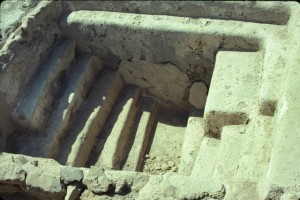Mishnah Miqva’ot 2:2-4, 8:1: The Fitness of a Ritual Pool
A mikveh is an artificial pool designed to gather and hold water for ritual purification. This passage deals with the requirements for such a pool.
2-2 If a mikveh 170 is measured and found to be lacking [the necessary amount of water]; all pure food that was prepared based on immersion in it ,171 whether [the mikveh is located] in [a] private or public [domain], is retroactively considered impure. Which things does this [principle] concern? Severe impurity. But more lenient impurity, 172 as [for example, if one] ate impure food, or drank impure drinks, or if his head and most of his body were submerged in drawn water, 173 or if three logs of drawn water fell on his head, and if he went down to immerse himself if he is uncertain whether he immersed or not, or if he [certainly] immersed but is uncertain whether [the mikveh] contained forty se’ah 174 [of water] or not; or if there were two mikva’ot and one had forty se’ah and the other did not, and he immersed himself in one of them, but does not know in which one he was immersed, he 175 is considered pure. Rabbi Yose [says that he is] impure, because Rabbi Yose says- anything that is of impure status, is always unfit until it is certain that it has become pure. But [when there is] uncertainty regarding whether something has become impure and [therefore] can render impure—it is considered pure.
3 [What is the case of] possibly drawn water that was declared pure by the Sages- if it is uncertain if [drawn water] fell in or if it did not fall [into the mikveh]; even if [drawn water] did fall [into the mikveh], if it is uncertain whether [the mikveh] has fortyse’ah or not; two mikva’ot, one that contains forty se’ah and one that does not, if [drawn water] fell into one of them but he does not know into which of them [the water] fell- it is presumed pure because he has something to rely on [to assume it to be pure]. If both were less than forty se’ah and [drawn water] fell into one of them, and he does not know into which it fell, it is presumed impure, because he does not have something to rely on [to assume it to be pure].
4 Rabbi Eliezer says- “A quarter log 176 of drawn water in the beginning 177 disqualifies the mikveh, [as do] three logim [of drawn water] on top [of the pure water]. 178 The Sages say- “Whether it is in the beginning or at the end, the [maximum] amount [of drawn water allowed is] three logim.”
8-1 The Land of Israel is pure and its mikva’ot are [considered] pure. 179 The mikva’ot of the nations that are outside the Land of Israel are considered fit for [immersion of] those who have had a seminal emission, 180 even if the [water] was filled up using a swipe, 181 since in the Land of Israel, outside the entrance [to the] cities, they are considered valid [for immersion] even for menstrually impure women. Inside the entrance [to the cities], they are valid for those who have had a seminal emission, and unfit for all [other] impure [people]. Rabbi Eliezer says- “Those that are near the city and the road are considered impure because of the laundry [water that may be spilled] there, and those that are far [from the city] are pure.”
169. Trans. A. Oded.
170. Ritual immersion pool.
171. During Temple times, pure food had to be prepared by someone who was ritually pure. If that person had become impure for any reason, immersion in a valid mikveh was one part of the purification process.
172. A category of ritual impurity decreed by the Sages.
173. Water for the mikveh must be from either rainfall or a naturally running stream. Drawn water may not be used, except to supplement a mikveh already containing 40 se’ah of natural water.
174. The required amount of water, equal to about 88 gallons at least.
175. Literally, “his doubtful case.”
176. A quarter logis equal in bulk to an egg and a half, about 4 oz.
177. Before there was any water in the pool.
178. After the pool has natural water, but before it has the required volume of 40 se’ah.
179. They are considered to be fit for immersion.
180. A lower level of impurity, not required by the Torah.
181. A lever and bucket device used to draw water from a well.
What do you want to know?
Ask our AI widget and get answers from this website
